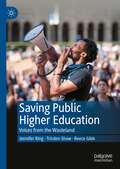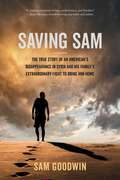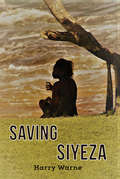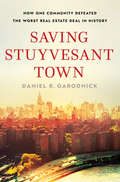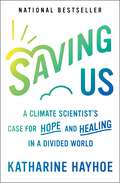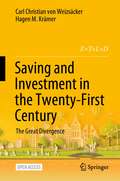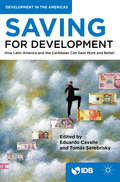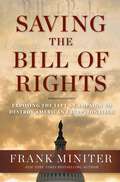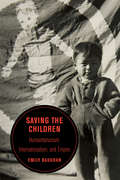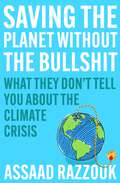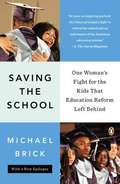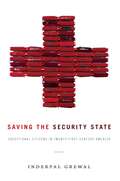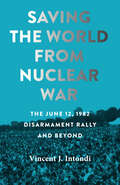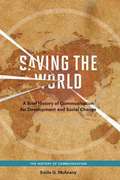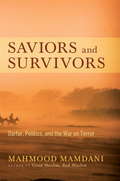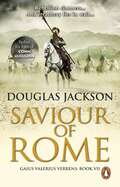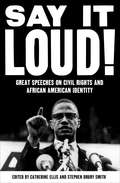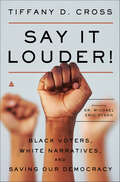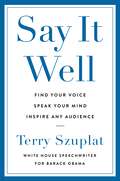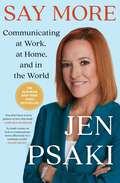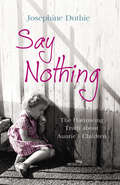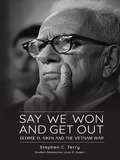- Table View
- List View
Saving Persuasion: A Defense of Rhetoric and Judgment
by Bryan GarstenIn today's increasingly polarized political landscape it seems that fewer and fewer citizens hold out hope of persuading one another. Even among those who have not given up on persuasion, few will admit to practicing the art of persuasion known as rhetoric. To describe political speech as "rhetoric" today is to accuse it of being superficial or manipulative. In Saving Persuasion, Bryan Garsten uncovers the early modern origins of this suspicious attitude toward rhetoric and seeks to loosen its grip on contemporary political theory. Revealing how deeply concerns about rhetorical speech shaped both ancient and modern political thought, he argues that the artful practice of persuasion ought to be viewed as a crucial part of democratic politics. He provocatively suggests that the aspects of rhetoric that seem most dangerous--the appeals to emotion, religious values, and the concrete commitments and identities of particular communities--are also those which can draw out citizens' capacity for good judgment. Against theorists who advocate a rationalized ideal of deliberation aimed at consensus, Garsten argues that a controversial politics of partiality and passion can produce a more engaged and more deliberative kind of democratic discourse.
Saving Public Higher Education: Voices from the Wasteland
by Jennifer Ring Trisden Shaw Reece GibbIn this book, eleven recent college graduates describe in vivid detail their journeys from racially segregated, underfunded public schools to a state university, and the obstacles they encountered along the way. Chapters highlight personal accounts of poverty, violence, and bullying in childhood, the persistence of racism on the university campus and the inability of faculty and administrators to combat it. Overcoming all-too-common barriers, these eleven students persevered, earned their degrees and continued on to graduate school and professional careers. The authors conclude the book with policy proposals that not only address the issues raised by the students, but that would also restore public education to its original role as an engine of opportunity and driver of democracy.
Saving Sam: The True Story of an American's Disappearance in Syria and His Family's Extraordinary Fight to Bring Him Home
by Sam GoodwinA gripping testament of resilience, family, and faith, this is the incredible and true story of an American traveler who was captured and wrongfully imprisoned in Syria while on a journey to experience every country in the world. What would you do if your son suddenly disappeared in Syria, and you had no idea what had happened to him? Would you contact the FBI? The State Department? Pray? Would you Google &“What to do if your son disappears in Syria&”? When the unthinkable happened, the answer, in the case of Ann Goodwin and her husband Tag, was: all of the above. Their 30-year-old son Sam, who was attempting to become one of the few people in history to travel to every single country on the planet, vanished in a supposed safe-zone run by the Kurds on the Turkish border. At first, they didn&’t even realize he had been abducted: maybe the phone reception had gone down, they told themselves, as had happened plenty of times before when Sam was in an off-the-beaten-path place. Just wait, he&’ll call back soon. But Sam never did call back, and over the coming days, the horror of their situation quickly bore down on the Goodwins, a devout Catholic family of seven living a middle-class suburban lifestyle in St. Louis, Missouri. Frustrated and increasingly terrified, the Goodwin&’s came to realize that they couldn&’t rely on their government to save Sam. They were going to have to do it themselves. This is the extraordinary story of Sam&’s abduction by the Syrian regime, who threatened to hand him over to ISIS for beheading if he did not confess to being a CIA spy. It&’s also the story of a Midwestern American family who transformed themselves into their own detective agency, building up a network of journalists, hostage negotiators, Middle East experts, Russian diplomats, Vatican envoys, and shady mercenaries, until eventually – by nothing short of a miracle – they found a secret backdoor into the heart of the Syrian intelligence service itself. Through multiple first-person narrators, Saving Sam recounts an inspiring and unforgettable saga that includes a travel journey to every country in the world, famous celebrities, heads of state, high-stakes diplomacy and critical life lessons around curiosity, uncertainty, prayer and what it ultimately means to be free. In a genuine, straightforward and sometimes humorous style, Sam draws on his experience as a hostage to demonstrate how we can all turn our own adversities into assets, whether it be in our personal, professional or spiritual lives.
Saving Siyeza
by Harry WarneAs a Basotho-born star graduate in Cape Town, Lesebo Bafokeng did not expect a life of turmoil. Due to inherited power and wealth as a tribal heiress, she instead survives torrid experiences – sexual assault and manipulation – that she eventually turns to her advantage. As an ideological feminist, she forces a way through Cape Town’s web of corruption and racial cultures to become its first black female mayor.She is not completely alone. With Maddox Illingworth, a British-born private investigator, and Kobus Labuschagne, an ambitious Afrikaner mayor, she is encouraged to triumph over an entrenched Indian warlord and political cabal headed by the Deputy President. The prize is Siyeza – a vast project to convert the Cape Flats from squalor and poverty to decent housing and modest prosperity for unemployed coloured and black inhabitants.Saving Siyeza catches all today’s bywords of South Africa – black and white love, have and have not, “big men, little people” in Africa, racial discord, breath-taking corruption and manipulation, cronyism and colonialism. Yet rising above come truth, honesty and trust, personified by a female visionary.
Saving Social Security: A Balanced Approach
by Peter A. Diamond Peter R. OrszagDiscusses options for addressing the problems facing the Social Security program.
Saving Stuyvesant Town: How One Community Defeated the Worst Real Estate Deal in History
by Daniel R. GarodnickFrom city streets to City Hall and to Midtown corporate offices, Saving Stuyvesant Town is the incredible true story of how one middle class community defeated the largest residential real estate deal in American history. Lifetime Stuy Town resident and former City Councilman Dan Garodnick recounts how his neighbors stood up to mammoth real estate interests and successfully fought to save their homes, delivering New York City's biggest-ever affordable housing preservation win. In 2006, Garodnick found himself engaged in an unexpected battle. Stuyvesant Town was built for World War II veterans by MetLife, in partnership with the City. Two generations removed, MetLife announced that it would sell Stuy Town to the highest bidder. Garodnick and his neighbors sprang into action. Battle lines formed with real estate titans like Tishman Speyer and BlackRock facing an organized coalition of residents, who made a competing bid to buy the property themselves. Tripped-up by an over-leveraged deal, the collapse of the American housing market, and a novel lawsuit brought by tenants, the real estate interests collapsed, and the tenants stood ready to take charge and shape the future of their community. The result was a once-in-a-generation win for tenants and an extraordinary outcome for middle-class New Yorkers.Garodnick's colorful and heartfelt account of this crucial moment in New York City history shows how creative problem solving, determination, and brute force politics can be marshalled for the public good. The nine-year struggle to save Stuyvesant Town by these residents is an inspiration to everyone who is committed to ensuring that New York remains a livable, affordable, and economically diverse city.
Saving Us: A Climate Scientist's Case for Hope and Healing in a Divided World
by Katharine HayhoeUnited Nations Champion of the Earth, climate scientist, and evangelical Christian Katharine Hayhoe changes the debate on how we can save our future in this nationally bestselling &“optimistic view on why collective action is still possible—and how it can be realized&” (The New York Times).Called &“one of the nation&’s most effective communicators on climate change&” by The New York Times, Katharine Hayhoe knows how to navigate all sides of the conversation on our changing planet. A Canadian climate scientist living in Texas, she negotiates distrust of data, indifference to imminent threats, and resistance to proposed solutions with ease. Over the past fifteen years Hayhoe has found that the most important thing we can do to address climate change is talk about it—and she wants to teach you how. In Saving Us, Hayhoe argues that when it comes to changing hearts and minds, facts are only one part of the equation. We need to find shared values in order to connect our unique identities to collective action. This is not another doomsday narrative about a planet on fire. It is a multilayered look at science, faith, and human psychology, from an icon in her field—recently named chief scientist at The Nature Conservancy. Drawing on interdisciplinary research and personal stories, Hayhoe shows that small conversations can have astonishing results. Saving Us leaves us with the tools to open a dialogue with your loved ones about how we all can play a role in pushing forward for change.
Saving and Investment in the Twenty-First Century: The Great Divergence
by Carl Christian von Weizsäcker Hagen M. KrämerThe economy of the 21st century in the OECD countries and in China, is characterized by a new phenomenon: the structural surplus of private savings in relation to private investment. This is true even in a situation of prosperity and very low interest rates. On the one hand, this excess saving is due to people's increasing inclination to save in light of rising life expectancy, driven by the desire to have sufficient assets in old age. On the other hand, the demand for capital is not increasing to the same extent, so that investment is not keeping pace with the rising desire to save. The resulting gap between the private desire for wealth and private investment can only be closed by increasing public debt. This open access book offers a new, capital-theoretical perspective on the macroeconomic relationship between desired wealth and investment, and it presents new empirical data on private wealth and its composition in the OECD plus China area. The authors argue that a free economic and social order can only be stabilized if the wealth aspirations of individuals are met under conditions of price stability. This is not possible without substantial net public debt. A new way of thinking about the economy as a whole is required. By way of an in-depth theoretical and empirical analysis, the book demonstrates this new way of thinking and describes the current challenges facing economic policy. It will appeal to economists and students of economics who are interested in macroeconomic theory and its economic policy implications.An impressive, and convincing theoretical dive into the fundamentals behind secular stagnation, with very strong implications for actual debt policy. Public debt may be needed to improve welfare.- Olivier Blanchard, Senior Fellow at the Peterson Institute for International Economics and Professor of Economics Emeritus at Massachusetts Institute of Technology (MIT). Chief Economist at the International Monetary Fund from 2008 to 2015. Saving and Investment in the Twenty-First Century gives a wholly new perspective on macroeconomics. (...) Weizsäcker and Krämer describe a simple, practical solution to the underemployment that has plagued Southern Europe for more than a decade.- George Akerlof, Nobel Laureate in Economics, 2001. Professor at the McCourt School of Public Policy at Georgetown University and Professor of Economics Emeritus at the University of California, Berkeley. This is a profound and original contribution that can help us to understand and act on the great issues of our times.- Nicholas Stern, Grantham Research Institute on Climate Change and the Environment at the London School of Economics. Author of the Stern Review Report on the Economics of Climate Change. Chief Economist at the World Bank from 2000 to 2003.
Saving for Development: How Latin America and the Caribbean Can Save More and Better
by Inter-American Development BankWhy should people - and economies - save? This book on the savings problem in Latin America and the Caribbean suggests that, while saving to survive the bad times is important, saving to thrive in the good times is what really counts. People must save to invest in health and education, live productive and fulfilling lives, and make the most of their retirement years. Firms must save to grow their enterprises, employ more workers in better jobs, and produce quality goods. Governments must save to build the infrastructure required by a productive economy, provide quality services to their citizens, and assure their senior citizens a dignified, worry-free retirement. In short, countries must save not for the proverbial rainy day, but for a sunny day - a time when everyone can bask in the benefits of growth, prosperity, and well-being.This book is open access under a CC BY-NC-ND 3.0 IGO license.
Saving the Bill of Rights: Exposing the Left's Campaign to Destroy American Exceptionalism
by Frank MiniterOur Founding Fathers created the Bill of Rights to document our unalienable rights and to strictly limit the government's power. These 10 amendments are central to what makes our great nation unique; the foundation of American exceptionalism. Yet, that foundation is quickly eroding. With every new sweeping regulation and invasive policy, the Obama administration is twisting the Bill of Rights and corrupting its true purpose. Here to rescue this sacred document from the leftist politicians and activist liberal judges is bestselling author Frank Miniter with his new book, Saving the Bill of Rights: Exposing the Left's Campaign to Destroy American Exceptionalism. In Saving the Bill of Rights, Miniter examines and explains the Bill of Rights amendment by amendment, reminding us exactly what we can do-and more importantly, what the federal government can't do. "The Left has hijacked The Bill of Rights," says Miniter, "and it's up to us to take it back." In Saving the Bill of Rights, Miniter reveals exactly how we can reassert the power of the Bill of Rights to its proper role in government and reestablish our Founding Fathers' vision for America.
Saving the Children: Humanitarianism, Internationalism, and Empire (Berkeley Series in British Studies #19)
by Emily BaughanSaving the Children analyzes the intersection of liberal internationalism and imperialism through the history of the humanitarian organization Save the Children, from its formation during the First World War through the era of decolonization. Whereas Save the Children claimed that it was "saving children to save the world," the vision of the world it sought to save was strictly delimited, characterized by international capitalism and colonial rule. Emily Baughan's groundbreaking analysis, across fifty years and eighteen countries, shows that Britain's desire to create an international order favorable to its imperial rule shaped international humanitarianism. In revealing that modern humanitarianism and its conception of childhood are products of the early twentieth-century imperial economy, Saving the Children argues that the contemporary aid sector must reckon with its past if it is to forge a new future.
Saving the Market from Itself
by Christopher MitchellThe 2007–9 financial crisis threatened economic disaster on a scale not seen since the Great Depression, but rapid state action prevented the widely feared devastation. The German response was considerably more generous to banks than the American or British bailouts. Drawing on interviews and primary sources in government, private firms, and media, Mitchell explains how the structure of national financial systems and interbank relationships produced extensive private rescues and pressure on different states. Mitchell explores the different responses and results in Germany, the UK and the US using a combination of detailed case study analyses of the three countries' responses to the crisis and a quantitative analysis of patterns of state responses to financial crises. This book will be essential reading for scholars and advanced students of political economy, comparative politics, economic sociology, economics, and public policy.
Saving the Planet Without the Bullshit: What They Don't Tell You About the Climate Crisis
by Assaad RazzoukHave you heard that you should go vegan to save the planet? Or carbon offset your flight to mitigate its effects? Or invest in an ethical pension plan? What if you were told that such actions make little difference at all? In Saving the Planet Without the Bullshit, Assaad argues that for too long green activism has been unfocused and distracted, trying to go in too many directions, focussing on individual behaviour. But all these things, are dwarfed by the one big thing that simply has to happen, very soon: namely, massively curtailing the activities of the hydrocarbon and petrochemicals industry. Full of counter-intuitive statistics and positive suggestions for individual and collective action, this ingenious book will profoundly change how you view the climate crisis.
Saving the School
by Michael BrickIn the race to save a failing public high school, one principal finds that making the numbers is only the beginning Being principal of Reagan High in Austin, Texas, was no dream assignment. Test scores were low, dropout rates were high, and poverty was endemic. But when Anabel Garza took the job, she started something no one expected. Racing against a deadline just to make the numbers, she set out to rebuild the kind of school that once unified neighborhoods across America. By her side, a basketball coach showed kids they could be winners, a young science teacher showed them they could learn, and a community rallied around a treasured institution. In this powerful rejoinder to the prevailing winds of education policy, Michael Brick takes readers inside the high-pressure world of a school on the brink. Paying overdue tribute to a vital American tradition—the great American high school—Saving the School exposes the flaws of a broken system but also tells an inspiring story of faith, hope, and perseverance. .
Saving the Security State: Exceptional Citizens in Twenty-First-Century America
by Inderpal GrewalIn Saving the Security State Inderpal Grewal traces the changing relations between the US state and its citizens in an era she calls advanced neoliberalism. Marked by the decline of US geopolitical power, endless war, and increasing surveillance, advanced neoliberalism militarizes everyday life while producing the “exceptional citizens”—primarily white Christian men who reinforce the security state as they claim responsibility for protecting the country from racialized others. Under advanced neoliberalism, Grewal shows, others in the United States strive to become exceptional by participating in humanitarian projects that compensate for the security state's inability to provide for the welfare of its citizens. In her analyses of microfinance programs in the global South, security moms, the murders at a Sikh temple in Wisconsin, and the post-9/11 crackdown on Muslim charities, Grewal exposes the fissures and contradictions at the heart of the US neoliberal empire and the centrality of race, gender, and religion to the securitized state.
Saving the World from Nuclear War: The June 12, 1982, Disarmament Rally and Beyond (Johns Hopkins Nuclear History and Contemporary Affairs)
by Vincent J. IntondiExamines how the June 12, 1982, rally for nuclear disarmament paved the way for a new generation of activists.On June 12, 1982, one million people filled the streets of New York City and rallied in Central Park to show support for the United Nations' Second Special Session on Disarmament. They demanded an end to the nuclear arms race and called for a shift from military funds to money allocated for human needs. In Saving the World from Nuclear War, Vincent J. Intondi draws on archival materials and interviews with rally organizers and activists in Central Park to explore this demonstration from its inception through the months of organizing, recruiting, and planning, to the historic day itself.
Saving the World: A Brief History of Communication for Devleopment and Social Change
by Emile G. McananyThis far-reaching and long overdue chronicle of communication for development from a leading scholar in the field presents in-depth policy analyses to outline a vision for how communication technologies can impact social change and improve human lives. Drawing on the pioneering works of Daniel Lerner, Everett Rogers, and Wilbur Schramm as well as his own personal experiences in the field, Emile G. McAnany builds a new, historically cognizant paradigm for the future that supplements technology with social entrepreneurship. McAnany summarizes the history of the field of communication for development and social change from Truman's Marshall Plan for the Third World to the United Nations' Millennium Development Goals. Part history and part policy analysis, Saving the World argues that the communication field can renew its role in development by recognizing large aid-giving institutions have a difficult time promoting genuine transformation. McAnany suggests an agenda for improving and strengthening the work of academics, policy makers, development funders, and any others who use communication in all of its forms to foster social change.
Saviors and Survivors: Darfur, Politics, and the War on Terror
by Mahmood MamdaniThose who insist on seeing the horrific violence in Darfur as a conflict between "Arabs" and "Africans" and as a genocide are failing to look at the historical and political context of the violence and are serving to delay political reconciliation with their calls for military intervention and their emphasis on retributive justice. So argues Mamdani (anthropology and politics, Columbia U. ), who urges us to rethink key assumptions about traditions, race, tribe, and locality in Darfur in order to better understand the conflict and how to move towards political reconciliation and peace. He sets his discussion of these issues within the context of colonial and nationalist historiographies of Sudan and Darfur, seeking to debunk the simplistic understanding of the violence as a conflict between Arab settler rulers and African natives. He argues instead that the violence should be seen as product of a land tenure system that set different tribes interests' against one another, sometimes along an Arab/non-Arab axis and sometimes along an Arab/Arab axis. Annotation ©2010 Book News, Inc. , Portland, OR (booknews. com)
Saviour of Rome: (Gaius Valerius Verrens 7): An action-packed historical page-turner you won’t be able to put down (Gaius Valerius Verrens #7)
by Douglas JacksonA gripping and breath-taking novel of Roman adventure from bestselling author Douglas Jackson. Perfect for fans of Simon Scarrow and Ben Kane.Readers are loving Gaius Valerius Verrens! "Spellbinding" - 5 STARS"I didn't want to come to the end, some really fascinating detail and a great story." - 5 STARS"Unexpected twists and an ending full of surprise rates it among my favorite reads to date." - 5 STARS"Kept me absolutely gripped from start to finish [-] historically accurate with the fictitious stories and characters expertly weaved into the real makes it utterly believable." - 5 STARS*****************************************REBELLION SIMMERS...AND TREACHERY LIES IN WAIT. AD 72: Vespasian is Emperor of Rome - but his grip on power is weakening. Economic disaster threatens the city - and when Rome is threatened, so too is the Empire.Recently married and building a new home, Gaius Valerius Verrens thought he'd at last found a life away from the battlefield. But he is summoned by the Emperor to do one last favour for Rome: he must journey to the remote, mountainous region of Asturica Augusta and investigate claims that a bandit called 'The Ghost' is raiding the Empire's gold convoys.When Valerius arrives, he finds a tortured, gods-forsaken land whose native tribes, exploited for so long, are a growing threat. But treachery lurks in the shadows, and it seems the real danger comes from those closer to him.Valerius must put an end to a conspiracy that would plunge the Empire into a devastating new conflict - but first he must establish who is a friend, and who a foe . . .Gaius Valerius Verrens's adventures continue in Glory of Rome.
Say It Loud!: Great Speeches on Civil Rights and African American Identity
by Catherine Ellis and Stephen Drury SmithFollowing Say It Plain, a collection of speeches that provides &“a sweeping perspective on evolving issues of black identity in the struggle for equality&” (Booklist). In &“full-throated public oratory, the kind that can stir the soul&”, Say It Plain collected and transcribed speeches by some of the twentieth century&’s leading African American cultural, literary, and political figures. Many of the speeches were never before available in printed form (Minneapolis Star-Tribune). Following the success of that groundbreaking volume, the Say It Loud! book adds new depth to the history of the modern struggle for racial equality and civil rights—focusing directly on the pivotal questions black America grappled with during the past four decades of resistance. With recordings unearthed from libraries and sound archives, and made widely available here for the first time, Say It Loud! includes powerful speeches by Malcolm X, Angela Davis, Martin Luther King Jr., James H. Cone, Toni Morrison, Colin Powell, and many others. Bringing the rich immediacy of the spoken word to a vital historical and intellectual tradition, Say It Loud! illuminates the diversity of ideas and arguments pulsing through the black freedom movement.
Say It Louder!: Black Voters, White Narratives, and Saving Our Democracy
by Tiffany CrossA breakout media and political analyst delivers a sweeping snapshot of American Democracy and the role that African Americans have played in its shaping while offering concrete information to help harness the electoral power of the country’s rising majority and exposing political forces aligned to subvert and suppress Black voters.Black voters were critical to the Democrats’ 2018 blue wave. In fact, 90 percent of Black voters supported Democratic House candidates, compared to just 53 percent of all voters. Despite media narratives, this was not a fluke. Throughout U.S. history, Black people have played a crucial role in the shaping of the American experiment. Yet still, this powerful voting bloc is often dismissed as some “amorphous” deviation, argues Tiffany Cross.Say It Louder! is her explosive examination of how America’s composition was designed to exclude Black voters, but paradoxically would likely cease to exist without them. With multiple tentacles stretching into the cable news echo chamber, campaign leadership, and Black voter data, Cross creates a wrinkle in time with a reflective look at the timeless efforts endlessly attempting to deny people of color the right to vote—a basic tenet of American democracy. And yet as the demographics of the country are changing, so too is the electoral power construct—by evolution and by force, Cross declares. Grounded in the most-up-to-date research, Say It Louder! is a vital tool for a wide swath of constituencies.
Say It Well: Find Your Voice, Speak Your Mind, Inspire Any Audience
by Terry SzuplatOne of Barack Obama’s longest-serving speechwriters reveals the public speaking lessons that will help you become a more confident and compelling communicator and leader.As a White House speechwriter, Terry Szuplat helped craft hundreds of speeches for President Obama. But when it came to public speaking himself, Szuplat—like many people—was gripped by anxiety and preferred to stay in the shadows. When he was invited to give the first major speech of his life, he faced a choice: keep hiding from what scared him, or finally face his fears.In Say It Well, Szuplat shares the life-changing lessons he learned from Barack Obama—one of the most admired speakers of our time—and how he applied these techniques to become a better speaker himself. In every chapter, he shares never-before-heard advice from Obama on speaking well, along with riveting behind-the-scenes stories of writing for a president—so you can master every step of public speaking, including:• Tips for overcoming stage fright• Best practices for using artificial intelligence to compose a memorable speech• Attention-grabbing openings to pull in any audience• Framing techniques to make your arguments more persuasive • Scientifically-proven ways to inspire people to action and to create the change you want• Tricks for editing, polishing, and practicing your words for maximum impact• The only way to end any great speechAlong the way, Szuplat introduces you to remarkable people from all walks of life—students, advocates, business executives, veterans—who have used these techniques to give speeches that have gone viral and inspired millions of people around the world. At a time of division and distrust, Say It Well also shows how we can all speak with the empathy, civility, and honesty that we need now more than ever.In sharing his journey to find his own voice, Szuplat will help you find yours. Written with humor and warmth, this is your new guide to the art of public speaking. And the next time you speak—whether you’re giving a toast or a eulogy for a loved one, a presentation at work, or an impassioned appeal for a cause you care about—not only will you know what to say, you’ll know how to say it well..
Say More: Lessons from Work, the White House, and the World
by Jen PsakiINSTANT NEW YORK TIMES BESTSELLER Former White House Press Secretary and current MSNBC host Jen Psaki shares the surprising lessons she&’s learned on her path to success and offers unique yet universal advice about how to be a more effective communicator in any situation.Not many White House Press Secretaries capture the nation&’s interest the way Jen Psaki did. Refreshingly candid and clear, Psaki quickly became known for her ability to break through the noise and successfully deliver her message. In her highly anticipated book, Psaki shares her journey to the Briefing Room and beyond, taking you along the campaign trail, to the State Department, and inside the White House under two Presidents. With her signature wit, Psaki writes about reporting to bosses from the hot-tempered Rahm Emanuel to the coolly intellectual Barack Obama to the surprisingly tenderhearted John Kerry. She also talks about her time working closely with President Joe Biden from the start of his administration to set a new tone for the country, restoring a sense of calm and respect for the role of the media in our Democracy. Since leaving the White House, Psaki&’s star has continued to rise. She launched a highly rated show on MSNBC and was so successful that in just six months she was given an additional primetime Monday slot, ahead of Rachel Maddow. And Psaki&’s work doesn&’t end at the office. She is the mother of two young children and shares her stories about the journey of communicating as a parent: During one bedtime briefing, her young daughter asked the question, &“Why do wars start?&”, which Jen carefully explained and then got a follow up: &“Have you ever seen a unicorn?&” In Say More, Psaki explains her straightforward approach to communication, walking you through difficult conversations as well as moments where humor saves the day—whether it is with preschoolers, partners, or presidents. She addresses the best ways to give and receive feedback, how to connect with your audience, how to listen actively, and much more. Say More is the book Psaki wishes she had when she started her career, and is a trove of entertaining, essential lessons from one of the most prominent voices in American politics today.
Say Nothing: The Harrowing Truth About Auntie's Children
by Josephine DuthieSay Nothing is the moving true story of four neglected siblings who were taken into care following the breakdown of their parents' marriage. Sent to a small croft in the north-east of Scotland, they endured an onslaught of physical and mental abuse at the hands of an elderly, inexperienced foster mother. For ten years the children's cries for help were ignored and misunderstood in the naive social-work climate of the late 1950s, and this heartbreaking personal account of cruelty and neglect reveals the effect this maltreatment had on their ability to adjust to a normal adult life.Say Nothing was written as a voice of support for all abused children who are afraid or were never given the chance to tell their story.
Say We Won and Get Out: George D. Aiken and the Vietnam War
by Stephen C. TerryGeorge D. Aiken, a hillside farmer and a liberal Republican Depression-era Governor, rose to national prominence as a leading GOP U. S. Senator and enduring critic of the Vietnam War from 1962-1975. Aiken’s long-standing friendship with Senate Majority Leader Mike Mansfield, an unheard of political alliance in today’s sharply divided Washington, forged bi-partisan opposition to the war. Aiken was neither “hawk” nor “dove”, but a “wise owl” who spoke his mind forcefully and bluntly to all against the war. He advised President Johnson to declare that the U. S. won the Vietnam War and to get out. Later, Aiken told President Nixon to stop bombing in Cambodia or he couldn’t be elected “dogcatcher.” This is pure Aiken speaking truth to power for ending America’s most controversial war, a common-sense voice that the Nation sorely needs today. This book demonstrates that bi-partisan Senate leadership has worked in the past and must be present in order to solve urgent national problems. Senator Aiken was a catalyst for forging consensus on issues from civil rights to foreign policy by being open-minded to all ideas that would help his constituents. Aiken’s philosophy was always to help people first. He never made decisions based on his party, a lost art in the current political environment. A Senator like George Aiken today would help show how to restore bi-partisanship.

